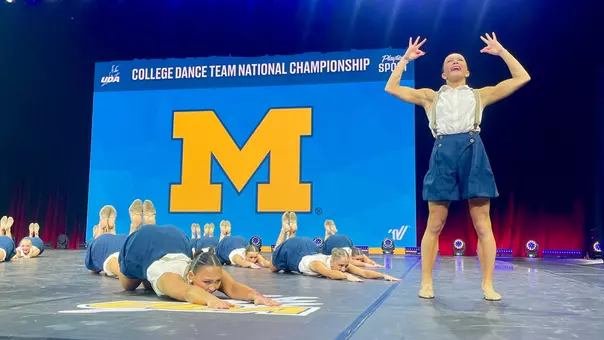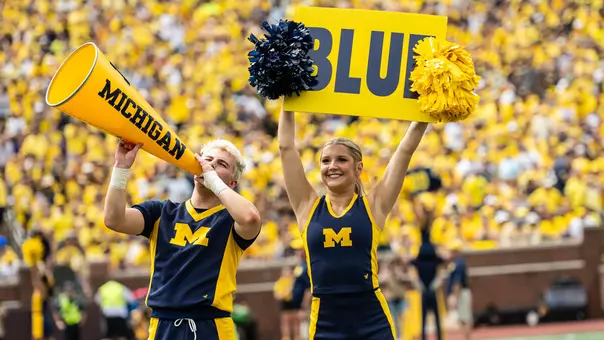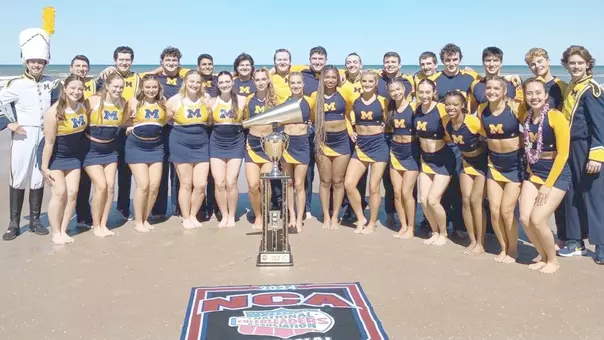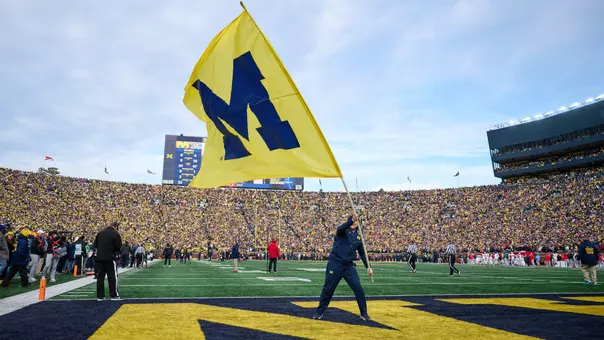
Scholar Stories: Cheerleader Coolidge Challenges Stereotypes as Nursing Student
4/18/2018 12:26:00 PM | Features, Spirit Department
By Austin Turner
University of Michigan cheer team member Liz Coolidge has always challenged the academic stereotype associated with being a cheerleader.
She's been a cheerleader since she was 5 years old. The junior from Chicago knows that cheerleading and academic excellence, to many, do not go hand-in-hand, but that has never stopped her from proving otherwise. Even in high school, she made that very clear.
"Academics have always been very important to me," she said. "My cheerleading co-captain in high school is now in the Ross School of Business here at Michigan. So even in high school, it was a big thing for us to push people academically and serve as an example."
Despite not always considering the idea of being a cheerleader at the collegiate level, Coolidge tried out and made the U-M cheer team during her senior year of high school. Though worried at first about being able to balance cheer with academics, she was quickly convinced.
"I have always been really big on grades and I am very high strung about that," Coolidge said. "There were a couple of older girls that assured me that I would be able to handle both."
Coolidge came to Michigan knowing she wanted to get into nursing. It's a rare major for student-athletes to pursue, but the challenges didn't keep her away. They attracted her.
"I have always been very interested in the medical field and have always been a caring person, so I looked into nursing and I shadowed a little bit in high school," she said. "Once I found out what the nurse practitioner program was like, I decided to pursue nursing as an undergrad instead of doing pre-med and trying to get into PA school."
Coolidge has not slowed down since first gaining interest. At the end of her freshman year, Coolidge was admitted to the honors program and began doing research with a faculty member at the U-M School of Nursing.
"She is a nurse practitioner and also implements research," Coolidge described. "Her research is on Adverse Childhood Experiences (ACES), which involves traumatic events happening before someone turns 18, such as abuse, neglect, divorce, parental incarceration.
"We are studying that and trying to implement an education model into the nursing school," she continued. "Many of the nursing students are not educated on how to interact and treat patients who have been through abuse and neglect. Because trauma is a cause for a lot of these illnesses, we want to try to prevent these things from happening later on in life. It is really interesting and trauma-informed care is really up and coming in the medical world."
Coolidge is clearly interested in this area of the medical world and has additionally involved herself in a student advisory board for a faculty group that is researching Complex Adverse Childhood Experiences and Complex AID (CASCAID).
"CASCAID and my research are different, but the topic is similar," said Coolidge. "I am in both so I can get more involved and gain more knowledge. CASCAID is a group of about 40 faculty members in the nursing school, with some looking at the education side and others looking at how nurses are practicing."
Though very interested in the research that she is doing, Coolidge prefers the social interaction that comes with being a nurse.
"I really enjoy getting to know the patients," she stated. "With nursing and holistic care, I get to look at the social, emotional and mental well-being. I get to be in the room with the patients, getting to know about them and hearing their life stories. It is really awesome when they open up with me."
With three years of experience behind her, Coolidge is starting to look toward the future. This summer she will be working at Northwestern in a Neurosurgical ICU, where she will continue to build on her knowledge while preparing for the opportunities that lie ahead.
"This past semester, neuro was really my passion," said Coolidge. "Next year we are doing clinical in critical care, which is in the ICU. I really wanted to prepare myself for that senior year and this opportunity will really help."
Not only will Coolidge use this summer's experience to help her for her clinical next year, but she plans to use it for life after school as well. After graduating next spring, she hopes to continue to work in an ICU for a couple of years before she attends graduate school.
But that has not always been the plan.
"Coming into college I thought that I would go through undergraduate school and then come back to graduate school and become a nurse practitioner," she said. "But after being in nursing school, I have seen all of the routes that can be taken after school. It is really recommended to work for a little bit and then go to grad school, and that is what I plan to do."
Coolidge knows, however, that there is a lot of time between now and then. In the meantime, she will continue to excel in the classroom with help from her teammates.
"We all motivate each other," Coolidge said about the team. "Our team is full of hard-working students, from engineers to pre-med students. I don't think there is anywhere else like U-M where there is so much focus on athletics and academics. People are always shocked to hear that this team is full of such smart people."
With support from her team, Coolidge is determined to continue to disprove stereotypes.










